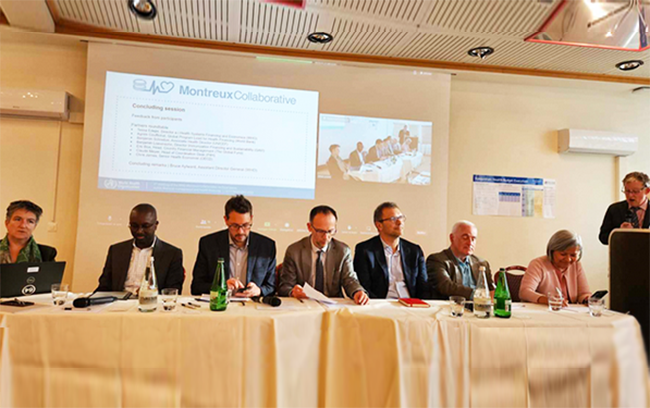The 6th meeting of the WHO Montreux Collaborative on Fiscal Space, Public Financial Management and Health Financing[1] was held in Montreux, Switzerland from 14-16 November 2023.
High-level finance and health-ministry representatives, development partners, and subject-matter experts met to identify how to more effectively strengthen public finance systems to support progress toward universal health coverage (UHC). In this blog post, we summarize the meeting’s key messages and conclusions, and suggest ways for countries to accelerate their implementation of reforms.
Background on the Montreux Collaborative
The Montreux Collaborative meeting[2], convened biennially by WHO since 2014, brings together country representatives, partners, and experts to discuss the relationship between fiscal space, public financial management (PFM), and health financing. These meetings highlight the critical role of public financing and of PFM systems in supporting progress toward UHC, and serve as fora for sharing evidence on reforms to address bottlenecks in PFM that affect public expenditure on health.
The Montreux Agenda focuses on the role of domestic budgets in expanding health coverage and assuring financial protection for the public. The Agenda builds on WHO-led research into the “mechanics” of public finance systems in health, conducted in collaboration with partners including the World Bank, the International Monetary Fund (IMF), the Organisation for Economic Co-operation and Development (OECD), UNICEF, Gavi, The Vaccine Alliance (Gavi), and the Global Fund to Fight AIDS, Tuberculosis and Malaria (The Global Fund). WHO also collaborates frequently with CABRI, International Budget Partnership, the Overseas Development Institute, Results for Development, ThinkWell, and P4H in this area of work.
The 2023 meeting focused on learning from the COVID-19 pandemic to identify adjustments to PFM that can improve systems’ resilience to withstand shocks; clarifying what is needed from PFM to finance primary healthcare (PHC) more effectively; and unpacking the chronic underspending of health budgets, with discussion of joint solutions between finance and health actors.
Key takeaways
The meeting’s discussion of COVID-19 highlighted the role played by PFM systems in providing an adequate budgetary response to pandemics. Participants reached consensus on key parameters for making PFM more responsive to shocks, including using and expanding budget allocation flexibilities, streamlining budget spending protocols, and providing greater spending discretion to health service providers, while increasing accountability for outputs through robust financial information systems. There was clear recognition that the pandemic increased the need for cross-sectoral collaboration; and of the challenges in implementing budgetary and accountability mechanisms that bridge health and non-health sectors.
Discussions of PHC financing emphasized the role of public finance arrangements, channels, and incentives in ensuring effective delivery of primary care services. Programme-based budgeting (PBB) was presented as a tool to better align budgetary resources with primary care providers’ needs. Evidence reviewed suggested that countries have yet to realize PBB’s potential to this end, due to design issues and ongoing use of input-based control. In addition, participants agreed on the need to grant service providers more autonomy, including the ability to retain generated funds, to influence budgeting, and to more flexibility manage operating costs. To optimize the strategic purchasing of health services, the role of subnational authorities (e.g., districts and provinces) also needs to be clarified, given the decentralization processes which are ongoing in many countries.
The discussion of health budget execution highlighted chronic challenges in low-income countries, in which health budget execution has been poor, with deterioration since 2010 according to the WHO/World Bank’s most recent review of the data. This situation has resulted both from low absorptive capacities in the health sector, and systemic PFM bottlenecks, such as rigidly structured budgets, which impede capacity to spend at each stage of the budget cycle. Participants agreed to encourage countries to examine PFM bottlenecks by budget-cycle stage and by actor (health, finance, subnational level), as a means of identifying priority solutions.
Pre-and post-event workshops offered deep-dive discussions of two complementary topics. In the first workshop, experts discussed practicalities of scaling up “direct facility financing,” a promising arrangement for financing primary care using domestic financing and country public finance systems and institutions for delivery. The post-event workshop focused on arrangements for external aid to the health sector, focusing on how to ensure better complementary between foreign and domestic resources. With the launch of the Lusaka Agenda on the Future of Global Health Initiatives (FGHI) one month after the Montreux Collaborative meeting, there is momentum for stronger alignment between Global Health Initiatives and countries’ domestic PFM arrangements.
Moving forward
Given current tight fiscal contexts, countries should prioritize reform of PFM as a means of increasing the agility and maximizing the value of public spending on health. PFM reforms are not necessarily “big bang” reforms – they can be done incrementally but require sustained political commitment. The experience of responding to the COVID-19 pandemic has shown how PFM can become more responsive to shocks; these lessons should be incorporated into routine systems.
The Montreux meeting shed light on five high-level shifts needed to enable PFM systems to support UHC more effectively:
- Accelerate the health sector’s adoption of PBB when context appropriate, with careful definition of budgetary programmes to align budgets with priority needs for health, increase flexibility of public spending on health, and enhance accountability for outputs.
- Prioritize actions to address low budget execution in health, by identifying PFM bottlenecks by stage of the budget cycle and selecting actionable remedies for health and finance authorities to implement.
- Develop a new compact for and with primary care providers, securing direct access to public funding, providing a greater margin of maneuver for management of operating costs, and increasing financial accountability while enabling accountability for outputs.
- Reconcile financial and non-financial performance-monitoring systems to ensure coherence, consistency, and comprehensiveness in transparency and accountability for health outputs, and to inform future budget allocations.
- Account for, and address, non-technical dimensions of PFM reforms from the beginning to gain wider buy-in in both the health and finance arenas – given the shifts in power of budget allocation, spending decisions, and managerial processes that can result from those reforms.
In 2024-2025, WHO, the World Bank, and UNICEF will strengthen their collaboration to support countries in adopting this Agenda. This renewed partnership aims to accelerate and better coordinate technical assistance provided to countries, to harmonize guidance, and accelerate the development of capabilities. The three organizations will organize the next Montreux meeting in November 2025. We look forward to working with all of you on this Agenda to contribute to the 2030 Sustainable Development Goals!


